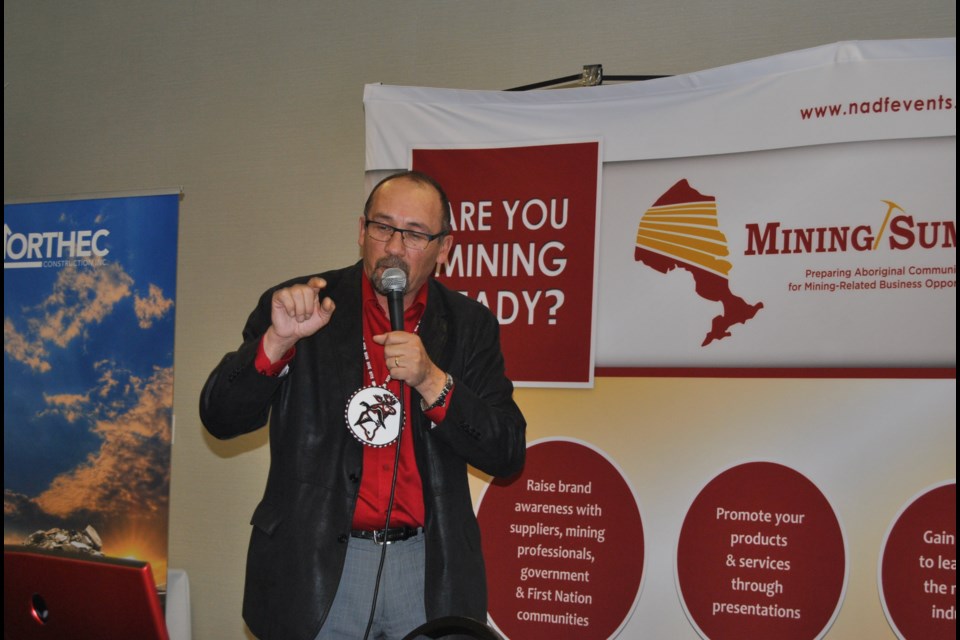Mushkegowuk Grand Chief Jonathan Solomon told an audience attending Nishnawbe Aski Development Fund‘s Mining Ready Summit in Timmins that a direct link exists between the deceptions of Treaty 9 signed by Northern Ontario First Nations and the subsequent abuses suffered under the residential school system.
The driving force was Duncan Campbell Scott, the chair of the negotiating commission that led to the signing of Treaty 9 in 1905. Later Campbell Scott as deputy minister for Indian Affairs supervised the residential school system.
“We never surrendered our lands when our elders signed Treaty 9,” Grand Chief Solomon said on Thursday. “We agreed to sharing the land, based on oral promises made to our elders.”
Grand Chief Solomon said Treaty 9 would never have been signed, if the Canadian negotiating team had told the truth about rights the treaty took away from them.
“At all the meeting places where the treaty was to be signed they only had one copy of the treaty and it was written in English,” Solomon said. “No one bothered to translate the sections of the treaty in Omushkego or Ojibway.”
“Our forefathers were told Treaty 9 would change nothing and they could go on fishing and hunting and their traditional way of life for as long as the sun rose, the grass grew and the rivers flowed,” Solomon stated.
“On top of that they would also receive $4.00 a year as part of the signing in perpetuity,” explained the Grand Chief. “True to their word every year a Canadian government official shows up at Kashechewan, where I am from, with a nicely folded Canadian flag to hand out $4.”
“I know I get my $4 every year,” Solomon said.
The deception of the Canadian negotiating team came to light in 1995 when the diaries of Daniel McMartin, the Ontario representative were discovered in the Queens University Archives.
McMartin kept a detailed almost verbatim record of statements made by the commissioners as they described the terms of Treaty 9 through translators.
“But they didn’t tell our great grandfathers that if a mine went up we could no longer live there or hunt or fish there,” he explained. “No one bothered to translate that part to them.”
“If a hydro dam flooded our lands, or a forestry company seized our forests, no one told our elders that they could no longer live there or fish, hunt and trap there,” Solomon added.
The words described in the McMartin diary confirm what the Mushkegowuk and Ojibway elders said they were told verbally by the negotiating team.
“A man named Moonias scoffed at the idea that he would get anything from the Canadian government for nothing,” Solomon pointed out.
Solomon also explained that several elders became upset because they believed that the treaty would force them to hunt in that tiny section of land called a reserve. They did not understand the concept of a reserve.
“But the negotiators continued to reassure the elders that their fishing, hunting and trapping would continue undisturbed,” said Solomon.
When they finally signed the treaty they were told that the purpose of the treaty was their happiness and prosperity but those two goals still have not been achieved 111 years later according to Grand Chief Solomon.
“All we want is that Canada and Ontario follow the terms of the agreement as was orally expressed to our forefathers,” Solomon said.
In addition to negotiating Treaty 9 in 1905, Duncan Campbell Scott had a 52-year career with Indian Affairs working his way up to the rank of Deputy Minister.
During his tenure indigenous children between the ages of 7 and 15 years had to attend residential schools. Parents who resisted sending their children away had them forcibly taken away from them by priests, Indian agents and the RCMP. Abuses at the hands of teachers and priests were noted by a Royal Commission looking to abuses and deaths at residential schools.
A slide presented by Grand Chief Solomon quoted Campbell Scott.
“I want to get rid of the Indian Problem. I do not think as a matter of fact, that the country ought to continuously protect a class of people who are able to stand a lone…our objective is to continue until there is not a single Indian in Canada that has not been absorbed into the body politic and there is no Indian question and no Indian Department…”
Solomon acknowledged things are improving pointing to Supreme Court of Canada judgments that support First Nations land claims and prior consent before companies operate in traditional territory. The MOU between First Nations and the Ontario government enshrining prior consent and conducting relations on a nation to nation basis is another improvement.



